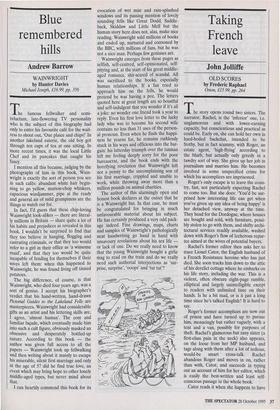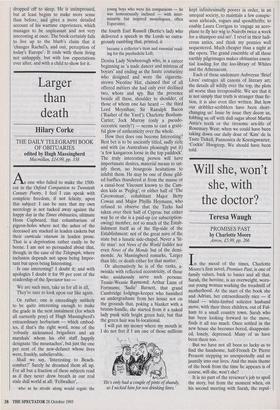Taking French leave
John Jolliffe
OLD SCORES by Frederic Raphael Orion, £15.99, pp. 264 The story opens round two sisters. The narrator, Rachel, is the 'inferior' one, i.e. unglamorous and with lower-earning capacity, but conscientious and practical as could be. Early on, she can hold her own in hard-boiled backchat, intended to be frothy, but in fact scummy, with Roger, an estate agent, 'high-flying' according to the blurb, but actually only greedy in a tawdry sort of way. She gives up her job in journalism and marries him. He becomes involved in some unspecified crime for which his accomplices are imprisoned.
Roger's only escape is to leave the coun- try, fast, not particularly expecting Rachel to come too. But she does: 'You'd be sur- prised how interesting life can get when you've given up any idea of being happy' is her detached view, anyway at the time. They head for the Dordogne, where houses are bought and sold, with furniture, possi- bly stolen to go with them, and shifty archi- tectural services readily available, washed down with Roger's flow of lecherous repar- tee aimed at the wives of potential buyers.
Rachel's former editor then asks her to trace Lionel Cator, the English husband of a French Resistance heroine who has just died. She soon tracks him down to the attic of his derelict cottage where he embarks on his life story, including the war. This is a violent, often obscure eight-page ramble, elliptical and largely unintelligible except to readers with unlimited time on their hands. Is he a bit mad, or is it just a long time since he's talked English? It is hard to say.
Roger's former accomplices are now out of prison and have turned up to pursue him, menacingly but rather vaguely, with a tent and a van, possibly for purposes of theft. Rachel's glamorous but zany sister (a first-class pain in the neck) also appears, on the loose from her MP husband, and tags along with them after a lot of tedious, would-be smart cross-talk. Rachel abandons Roger and moves in on, rather than with, Cator, and succeeds in typing out an account of him for her editor, which is easily the best-written and least self- conscious passage in the whole book.
Cator reads it when she happens to have dropped off to sleep. He is unimpressed, but at least begins to make more sense than before, and gives a more detailed account of his wartime experiences, which manages to be unpleasant and not very interesting at once. The book certainly fails to live up to the blurb's claim that it `changes Rachel's, and our, perception of today's Europe'. It ends with them living not unhappily, but with low expectations ever after, and with a child to show for it.



































































 Previous page
Previous page